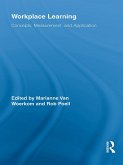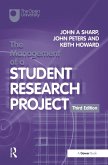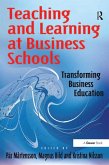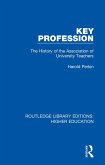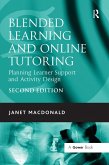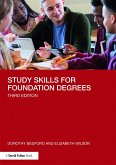41,95 €
41,95 €
inkl. MwSt.
Sofort per Download lieferbar

21 °P sammeln
41,95 €
Als Download kaufen

41,95 €
inkl. MwSt.
Sofort per Download lieferbar

21 °P sammeln
Jetzt verschenken
Alle Infos zum eBook verschenken
41,95 €
inkl. MwSt.
Sofort per Download lieferbar
Alle Infos zum eBook verschenken

21 °P sammeln
- Format: PDF
- Merkliste
- Auf die Merkliste
- Bewerten Bewerten
- Teilen
- Produkt teilen
- Produkterinnerung
- Produkterinnerung

Bitte loggen Sie sich zunächst in Ihr Kundenkonto ein oder registrieren Sie sich bei
bücher.de, um das eBook-Abo tolino select nutzen zu können.
Hier können Sie sich einloggen
Hier können Sie sich einloggen
Sie sind bereits eingeloggt. Klicken Sie auf 2. tolino select Abo, um fortzufahren.

Bitte loggen Sie sich zunächst in Ihr Kundenkonto ein oder registrieren Sie sich bei bücher.de, um das eBook-Abo tolino select nutzen zu können.
In one volume, Understanding Work-Based Learning makes a valuable contribution to current employer engagement and learner demand debates, and provides first hand experiences to guide existing and potential work based learners, employers, educationalists, policy makers, and researchers.
- Geräte: PC
- mit Kopierschutz
- eBook Hilfe
- Größe: 3.96MB
Andere Kunden interessierten sich auch für
![Understanding Work-Based Learning (eBook, ePUB) Understanding Work-Based Learning (eBook, ePUB)]() John MumfordUnderstanding Work-Based Learning (eBook, ePUB)41,95 €
John MumfordUnderstanding Work-Based Learning (eBook, ePUB)41,95 €![Workplace Learning (eBook, PDF) Workplace Learning (eBook, PDF)]() Workplace Learning (eBook, PDF)64,95 €
Workplace Learning (eBook, PDF)64,95 €![The Management of a Student Research Project (eBook, PDF) The Management of a Student Research Project (eBook, PDF)]() John A SharpThe Management of a Student Research Project (eBook, PDF)38,95 €
John A SharpThe Management of a Student Research Project (eBook, PDF)38,95 €![Teaching and Learning at Business Schools (eBook, PDF) Teaching and Learning at Business Schools (eBook, PDF)]() Pär MårtenssonTeaching and Learning at Business Schools (eBook, PDF)54,95 €
Pär MårtenssonTeaching and Learning at Business Schools (eBook, PDF)54,95 €![Key Profession (eBook, PDF) Key Profession (eBook, PDF)]() Harold PerkinKey Profession (eBook, PDF)34,95 €
Harold PerkinKey Profession (eBook, PDF)34,95 €![Blended Learning and Online Tutoring (eBook, PDF) Blended Learning and Online Tutoring (eBook, PDF)]() Janet MacdonaldBlended Learning and Online Tutoring (eBook, PDF)47,95 €
Janet MacdonaldBlended Learning and Online Tutoring (eBook, PDF)47,95 €![Study Skills for Foundation Degrees (eBook, PDF) Study Skills for Foundation Degrees (eBook, PDF)]() Dorothy BedfordStudy Skills for Foundation Degrees (eBook, PDF)18,95 €
Dorothy BedfordStudy Skills for Foundation Degrees (eBook, PDF)18,95 €-
-
-
In one volume, Understanding Work-Based Learning makes a valuable contribution to current employer engagement and learner demand debates, and provides first hand experiences to guide existing and potential work based learners, employers, educationalists, policy makers, and researchers.
Dieser Download kann aus rechtlichen Gründen nur mit Rechnungsadresse in A, B, BG, CY, CZ, D, DK, EW, E, FIN, F, GR, HR, H, IRL, I, LT, L, LR, M, NL, PL, P, R, S, SLO, SK ausgeliefert werden.
Produktdetails
- Produktdetails
- Verlag: Taylor & Francis eBooks
- Seitenzahl: 220
- Erscheinungstermin: 24. Februar 2016
- Englisch
- ISBN-13: 9781317004516
- Artikelnr.: 44815462
- Verlag: Taylor & Francis eBooks
- Seitenzahl: 220
- Erscheinungstermin: 24. Februar 2016
- Englisch
- ISBN-13: 9781317004516
- Artikelnr.: 44815462
- Herstellerkennzeichnung Die Herstellerinformationen sind derzeit nicht verfügbar.
Professor Roodhouse has substantial experience as an educator, manager and researcher in the fields of management, education, training and creative industries. He is extensively published in national and international journals such as, the International Journal of Arts Management, the International Journal of Museum Management and Curatorship, and the Journal of Arts Management, Law and Society. He has been guest editor of journals such as the Journal of Vocational Education and Training, and sits on various editorial boards including, most recently, the Education and Training Journal. His book on Cultural Quarters was published In 2006 by Intellect followed by Employers Skils and Higher Education published by Kingsham Press in 2007 and he is founding editor of the Creative Industries Journal with Middlesex University. Currently he is Professor at the Institute for Work Based Learning, Middlesex University and the University of Technology, Sydney. In addition he has worked with Dr Mumford at the University Vocational Awards Council as the founding Chief Executive and more recently the Technical Director at HE@Work Dr Mumford has been a champion of workplace skills and the accreditation of workplace learning for many years. He is chair of HE@WORK, and was until recently a board member of the Universities Vocational Awards Council. He is Visiting Senior Fellow at Surrey University School of Management, past Chairman of the Sector Skills Council for Oil, Gas, Chemicals and Nuclear, and a Board Member of Foundation Degree Forward, and the environmental charity Green-Works. Dr Mumford served at BP for over 30 years spanning senior management positions in Europe, Australasia and Asia. From 1998-2006, as BP Vice President UK Region, he dealt extensively with BP's reputation, governance and government relations issues. In 2003, Dr Mumford received an OBE, for his services to the environment. He is a noted public figure for his work in alternative energy and the environment particularly in transport.
Contents: Foreword
Introduction
Part I Making Sense of Work-Based Learning: The genesis of university work-based learning, Simon Roodhouse
Defining and theorizing university work-based learning, Simon Roodhouse
Legitimising work based learning programmes of study, Penny McCracken
University models of work-based validation, Tony Wall
Recognising, assessing and rewarding work experience, Jonathan Garnett
Supporting learners through mentoring in the workplace, Ann Minton. Part II The Learner's Experience: Introduction to case studies
Case study 1: an SME owner and an MBA
Case study 2: a police officer undertakes an external MBA
Case study 3: a supermarket dotcom training manager and a work-based degree
Case study 4: a senior manager, oil company vice president, and a PhD
Case study 5: a civil servant, a degree and professional qualifications
Case study 6: a care commission officer with the Scottish Commission for the Regulation of Care (care commission) and a graduate certificate
Case study 7: a learning architect, designing programmes that engage and a doctoral research programme
Case study 8: IT operations manager and a foundation degree in business management
Case study 9: a local authority manager and a work-based masters degree
Case study 10: working with children and learning recognition
Case study 11: a wife, mother, employee and a part-time degree
Case study 12: McDonalds and achieving a foundation degree
Case study lessons, John Mumford. Part III The Rights of the Learner: The informed learner
References
Index.
Introduction
Part I Making Sense of Work-Based Learning: The genesis of university work-based learning, Simon Roodhouse
Defining and theorizing university work-based learning, Simon Roodhouse
Legitimising work based learning programmes of study, Penny McCracken
University models of work-based validation, Tony Wall
Recognising, assessing and rewarding work experience, Jonathan Garnett
Supporting learners through mentoring in the workplace, Ann Minton. Part II The Learner's Experience: Introduction to case studies
Case study 1: an SME owner and an MBA
Case study 2: a police officer undertakes an external MBA
Case study 3: a supermarket dotcom training manager and a work-based degree
Case study 4: a senior manager, oil company vice president, and a PhD
Case study 5: a civil servant, a degree and professional qualifications
Case study 6: a care commission officer with the Scottish Commission for the Regulation of Care (care commission) and a graduate certificate
Case study 7: a learning architect, designing programmes that engage and a doctoral research programme
Case study 8: IT operations manager and a foundation degree in business management
Case study 9: a local authority manager and a work-based masters degree
Case study 10: working with children and learning recognition
Case study 11: a wife, mother, employee and a part-time degree
Case study 12: McDonalds and achieving a foundation degree
Case study lessons, John Mumford. Part III The Rights of the Learner: The informed learner
References
Index.
Contents: Foreword
Introduction
Part I Making Sense of Work-Based Learning: The genesis of university work-based learning, Simon Roodhouse
Defining and theorizing university work-based learning, Simon Roodhouse
Legitimising work based learning programmes of study, Penny McCracken
University models of work-based validation, Tony Wall
Recognising, assessing and rewarding work experience, Jonathan Garnett
Supporting learners through mentoring in the workplace, Ann Minton. Part II The Learner's Experience: Introduction to case studies
Case study 1: an SME owner and an MBA
Case study 2: a police officer undertakes an external MBA
Case study 3: a supermarket dotcom training manager and a work-based degree
Case study 4: a senior manager, oil company vice president, and a PhD
Case study 5: a civil servant, a degree and professional qualifications
Case study 6: a care commission officer with the Scottish Commission for the Regulation of Care (care commission) and a graduate certificate
Case study 7: a learning architect, designing programmes that engage and a doctoral research programme
Case study 8: IT operations manager and a foundation degree in business management
Case study 9: a local authority manager and a work-based masters degree
Case study 10: working with children and learning recognition
Case study 11: a wife, mother, employee and a part-time degree
Case study 12: McDonalds and achieving a foundation degree
Case study lessons, John Mumford. Part III The Rights of the Learner: The informed learner
References
Index.
Introduction
Part I Making Sense of Work-Based Learning: The genesis of university work-based learning, Simon Roodhouse
Defining and theorizing university work-based learning, Simon Roodhouse
Legitimising work based learning programmes of study, Penny McCracken
University models of work-based validation, Tony Wall
Recognising, assessing and rewarding work experience, Jonathan Garnett
Supporting learners through mentoring in the workplace, Ann Minton. Part II The Learner's Experience: Introduction to case studies
Case study 1: an SME owner and an MBA
Case study 2: a police officer undertakes an external MBA
Case study 3: a supermarket dotcom training manager and a work-based degree
Case study 4: a senior manager, oil company vice president, and a PhD
Case study 5: a civil servant, a degree and professional qualifications
Case study 6: a care commission officer with the Scottish Commission for the Regulation of Care (care commission) and a graduate certificate
Case study 7: a learning architect, designing programmes that engage and a doctoral research programme
Case study 8: IT operations manager and a foundation degree in business management
Case study 9: a local authority manager and a work-based masters degree
Case study 10: working with children and learning recognition
Case study 11: a wife, mother, employee and a part-time degree
Case study 12: McDonalds and achieving a foundation degree
Case study lessons, John Mumford. Part III The Rights of the Learner: The informed learner
References
Index.


